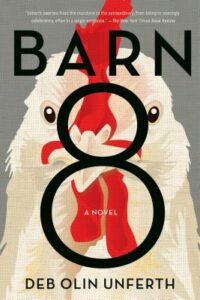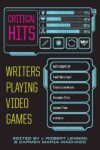
[Graywolf Press; 2020]
The hero of Barn 8 is a chicken. A runaway hen named Bwwaauk, to be precise, who doesn’t show up until 35 pages into the novel, and makes no more than five further appearances in the story. But without Bwwaauk’s intrepid escapism, which sets her in the path of Cleveland, the head of Iowa layer hen farm audits, the 900,000-chicken heist around which Barn 8 revolves could never have been dreamed up.
The plan is simple: call upon 101 investigators (vegans who go undercover as farm employees to document inhumane animal conditions) to bring 2 friends each; at nightfall, the 303 activists plus the organizers of the action (Cleveland and Janey, Cleveland’s dead babysitter’s daughter, Dill, the washed up ex-director of the local animal rights office, Annabelle, the radical daughter of the farmer from whom the chickens will be stolen, and Johnathan, her ex-husband, who’s in charge of logistics) sneak onto the small chicken farm and load 60 commercial trucks with approximately 15,000 chickens each; deposit the truckloads of chickens at various sanctuaries around the country, sanctuaries most likely not equipped to care for the thousands of chickens which they’ve agreed to take. There will be no documentation of this action from the activist’s end, only the inevitable news footage that will appear once the farmer realizes that his chickens have flown the coop. So why do it at all? This is the question that everyone, investigators and organizers alike, ask themselves. The absurdity of the heist will accomplish nothing in the long run. Surely the chickens will just be replaced by the farmer, whose insurance must cover grand theft larceny.
Annabelle has an answer: “The point is not to use them. For a single fucking hour. Is it so much to ask?”
Freeing chickens for the sake of the chickens. Not for the sake of the world, or the sake of mankind. Not even for the sake of chickenkind. Just freeing the 900,000 chickens for those 900,000 chickens alone, so that they may, in their short, demoralized lives, experience a breath of air not poisoned by the stench of their own shit. So that they may walk, for once, on dirt, instead of on each other. So that they may, if they so choose, sit on the eggs that they lay.
If this sounds like a funny book, that’s because it is one. Let’s face it: chickens are funny, and so are eggs. Yes, chickens are intelligent, fierce, gorgeous creatures, and eggs are incredible feats of nature, all of which we learn in Barn 8, which sometimes reads like poetry, sometimes like a scene from a movie, and sometimes like a transcribed biology lecture from your most charismatic professor. Still, there’s something undeniably funny about a name like Bwwaauk or the phrase “the entire egg community.”
That Deb Olin Unferth is able to retain the humor throughout this book is remarkable, and while it speaks to her subject, it also speaks to her ability to cultivate a voice and perspective that is simultaneously realistic and absurd, speculative and premonitive, hopeful and hopeless. She achieves this by many means, including a collage-like form that pulls from an interrogation transcript, descriptions of earth after humans, factual information about chickens and their evolution, imagined information about chickens’ own mythology, and the perspectives of an extensive cast of interwoven characters, stretching into the past and future in a fluid way that speaks to the experience of recollection. This is the way we understand the world around us, in a patchwork of experiences, both lived and imagined, remembered, misremembered, unremembered either by choice or by coincidence. Olin Unferth sneaks commentary about a range of ideas into this patchwork, revealing the systemic nature of the apocalypse we’re living through: racism, classism, the gig economy, fantasy and obsession and depression, climate change, television, chemical contamination, Amazon, spirituality.
For a book about barnyards, Barn 8 is incredibly modern. No line sums up the current feeling of politics in America better than, “These days animal activism was less revolution, more capitalism with a conscience.” Looking at the world around me, I wouldn’t be surprised if it was one Olin Unferth made up. Taco Bell goes viral with a funny video to explain the pandemic-related absence of potatoes from the menu, and to announce those potatoes’ lauded return; Bed Bath & Beyond and Kohl’s renounce the MyPillow® guy for his pro-Trump sentiments; on Inauguration Day, I get an email from a sex toy company, celebrating “good vibes only” with 20% off the entire store. Meanwhile, our new President re-signs the Paris Agreement, signifying a commitment to reduce global warming. This is a commitment that should entail limitations on the kind of factory farming illustrated in Barn 8. But as we are reminded throughout the story, with those quips from a charismatic if reasonably pessimistic bio professor, it’s probably too late for that anyway. There is too much momentum behind the warming of the globe. We’re hurtling towards the end of humanity, the end of most life on earth, in fact. No signature or direct action will stop the coming end. The most we can reasonably hope to do is save a few hundred thousand chickens from suffering along the way.
While reading, I couldn’t help but remember Richard Powers’s The Overstory, which takes a similar epic approach to climate change activism. Rather than chickens, Powers explores the subject through the lens of trees; his cast, though bolstered with extras, is limited to the perspectives of nine characters, heroes of the same breed of futile environmental activism raised in Barn 8. The characters’ stories are buried in purple-prosed summaries, and while the heroes may be fallible, they are saved, turned majestic by the noble spirits of the trees. Unlike Barn 8, Powers’s tragedy doesn’t have a central event around which it whirls, and his characters meander through their lives, some of them not touching each other even remotely. Eventually, Powers makes a hard-to-follow claim that activism will never save us, but technology can. And if not us, it can save the planet. In what seems like a bid for the tech industry’s attention, he compares code (“the learners”) to cells, AI to real life. His 500-plus page novel ends on a sentimental and ultimately empty note: “This will never end.”
Barn 8 ends on a similar note, a variation of the trope “Life finds a way!” But the way it gets us there is more thrilling than it is tragic, and more nuanced than The Overstory’s monument to the obvious beauty in nature. Not only does Olin Unferth show the same events from multiple points of view, she provides context for each perspective, fleshing out the history of every character she introduces, not through summary but through scenes, the good guys (Animal Rights activists) and the bad guys (farmers) alike. No character is incidental — or every character is. The story could go in any way, but because every player is exactly who they are, it goes in this way: certain relationships develop, fall apart, come back together, a plan is hatched, a farm is mostly emptied of its chickens, none of the trucks destined for the sanctuaries make it to their destinations, but three trucks are safely emptied into a nuclear contamination site. Also, people go to prison. People fall in love. People experience loss, and eventually the loss extends to all of humanity and most of the other living creatures in the world. But not chickens. Because the story happens just the way it happens, chickens live on.
Hannah Lamb-Vines reads and writes in New York City, northern California, and the Texas panhandle, depending on the time of year. Her work has recently been featured or is forthcoming in Columbia Journal, HAD, and Black Telephone Magazine, among others.
This post may contain affiliate links.







